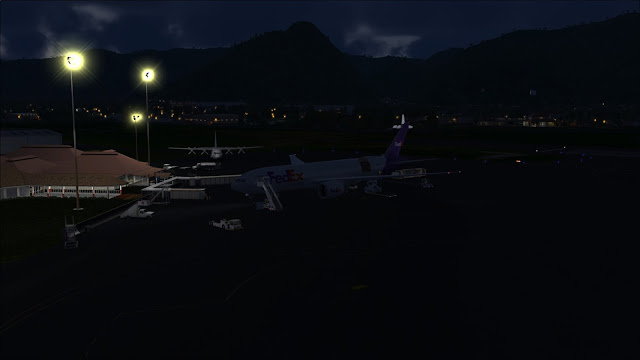The world of flight simulation saw recent scenery
releases from Orbx and FlyTampa. Thankfully,
companies continue to create new content for FSX and P3D to keep one of my
favorite hobbies alive. Orbx and FlyTampa
are both are well known and respected companies in the flight sim world and
these two packages did not disappoint.
Orbx released Pago Pago International airport and this package includes
7 airports and 17 islands in American Samoa in one package! Granted, I haven’t taken the time to explore
the area other than the main airport of NSTU and I need to fire up my Twin
Otter for some island hopping. FlyTampa
added Sydney Airport (YSSY) to their vast collection and the airport is well
done in normal FlyTampa fashion. YSSY
adds another major Australian international airport to my library and adds yet
another destination when deciding where to fly.
This blog is not intended as a review for the sceneries but as with my
other posts, I attempted to capture the details of the airports and the
surrounding scenery.
The citizens of American Samoa and aircraft
mechanics have recently complained about the lack of reliable package delivery
to their islands so FedEx recently added NSTU to their extensive list of
delivery destinations. For today’s
flight, my trusty Boeing 777-F was loaded with 166,000 pounds of aircraft
parts, jewelry, dairy products, and coffee beans. My first officer began the pre-flight flows
while the busy ground carefully loaded the cargo containers into the
aircraft. As the captain, I began
setting up the route which called for a 5 hour flight across the Pacific
Ocean. The weather at Sydney was calm with
cloudy conditions but visibility was good and a routine departure was
anticipated. The weather at Pago Pago on
the other hand was shaping up for a challenging approach with gusty
winds and rain showers. This would be my
first approach into Pago Pago so I wasn’t sure how things were going to work
out.
We pushed back on-time from the cargo ramp and the
WOL 1 departure was programmed into the FMC from RWY 34L. We lined up on the runway with the necessary
checklists completed and the large General Electric engines roared to life as
TOGA was engaged. We quickly climbed to
our cruising altitude of 35,000 feet with a planned step climb to 37,000
feet. We departed Australia to the
northwest, only to be greeted by an empty, albeit beautiful blue ocean with
scattered cloud formations lining the horizon.
Prior to reaching my top of descent (TOD), I began
reviewing the updated weather conditions and winds were reported at 19 knots
from the southeast and light rain showers.
NSTU does not have a formal “STAR” or standard terminal arrival so I
planned for the ILS approach for RWY 5.
The information was entered into the FMC and I reviewed the landing
chart to make sure I was able to meet the necessary altitude requirements. The TOD was reached and the jet began to
descend through the ominous gray and black cloud formations and the weather
radar was beginning to paint pink blobs on the navigation display. Granted, since this is a simulator and not
real life, I thoroughly enjoyed taking screenshots of the environment
surrounding the aircraft during the descent.
The weather was going to present a challenge, but I am always amazed at
how well FSX can depict real world weather into the simulation. It really captures the sense of “being there”
and it adds to the fun of flying the heavies on the computer.
Now, I must be honest and say this was not my best
approach. I did hand fly the jet down to
touchdown but I made the mistake of getting too low and did not follow the
glideslope properly. Thankfully, I was
able to gain a visual on RWY 05 and I could see that I was too low on the
approach. NSTU is surrounded by large
mountains and an area of raised terrain west of the runway. I was able to correct my approach but had
this been an approach with low visibility, I may have not been so lucky. The winds and mild turbulence bounced the big
777 around while bringing her down but I made the touchdown zone and the
spoilers extended with full reversers engaged to slow us down. A quick turn off the active and my first
officer was completing her shutdown checklist while I opened the cargo doors to
let the ground crew unload the goods.
Another flight in the bag with FedEx Virtual and looking forward to many
more into and out of Pago Pago and Sydney.
Upward and onward in the virtual world and enjoy the screenshots.
Add-ons
used for this flight:
FSX w/DirectX 10 Enabled (Steve’s DirectX
fixer)
PMDG 777-200LF (Freighter Model)
Orbx Global and Vector
Active Sky Next
REX 4 Texture Direct w/Soft Clouds
FlyTampa YSSY
Orbx NSTU
FSDreamTeam GSX (ground services)
FSFX 777 Immersion pack and PrecipitFX


























No comments:
Post a Comment